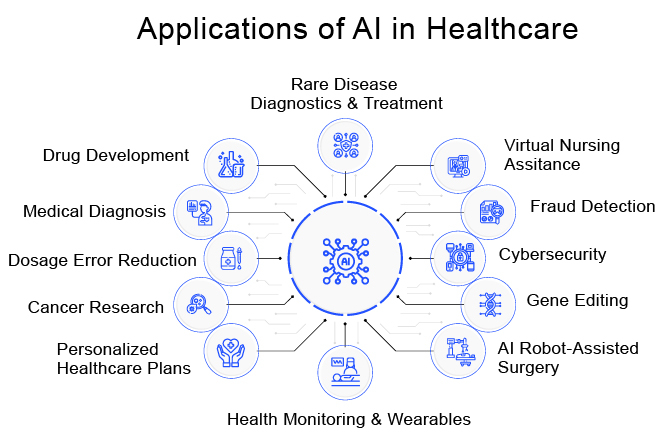Artificial Intelligence has proved to be one of the most revolutionary technologies that shall impact medical practices in the healthcare industry. It is very much molded by the models of machine learning, deep learning, natural language processing, and predictive analytics. From the stage of diagnosis to patient care coordination and drug discovery, AI enhances the clinical outcomes of a patient while optimizing the processes of efficiency within the healthcare ecosystem.
This article explores various applications of artificial intelligence in healthcare, including benefits, challenges, real-time examples, case studies, and how AI is poised to revolutionize the industry about healthcare.
AI in Healthcare: An Overview
AI in healthcare involves the application of algorithms, machine learning models, and advanced analytics to simulate human intelligence in medical tasks-including areas such as diagnosis, patient care, and research. Such systems are designed to analyze enormous data sets rapidly and accurately to ultimately help healthcare professionals decide with data insights and predictions.
The general purpose of AI in healthcare is to enable clinical workflows, streamline the operations involved, improve the accuracy of a diagnosis, and finally result in better patient outcomes. We will soon see that AI technology has already been applied to various parts of healthcare and remains on an upward trajectory.
The Future of Artificial Intelligence in Healthcare
1. Diagnostics: AI algorithms have begun to apply the applications in diagnosing diseases, including those from cancer, cardiovascular issues, and neurological disorders. The algorithm-based models can help in an analysis of all medical images like CT scans, MRIs, X-rays, or others, which enables them to seek anomalies which will point out conditions not yet established by human doctors.
2. Treatment Plans: AI systems will allow a doctor to provide the patient with a personalized treatment plan according to an individual’s specific medical history, genetic data, and lifestyle. The results will ensure that the patients receive more effective treatment without unnecessary procedures.
3. Predictive Analytics: Predictive analytics can predict onset of disease, or progression of diseases/conditions based on historical information, genetic markers, and lifestyle in AI. Predictive analytics allows providers to intervene more timely and enhance the management of patients, particularly in chronic diseases’ control.
4. Automation : AI reduces the bureaucratic aspects of scheduling, billing, and patient record-keeping. Automation also shrinks the costs, increases efficiency, and gives more time to care delivered to patients.
Applications of AI in Health Care
AI in Health Care Compliance
Perhaps the most critical application of AI in healthcare would relate to compliance with ever-evolving healthcare regulations. Compliance involves managing data about patients, ensuring their privacy, and the cooperation of professional standards such as HIPAA. AI can enable organizations to automate the monitoring and auditing of compliance processes by real-time data analysis, making alerts whenever violations or gaps in compliance happen.
For example, intelligent machines can have an eye for patient records to guarantee their proper encryption and ensure the safety of relevant access to sensitive information. Additionally, AI can assist in the evaluation of clinical practices to ensure that they are up to par with established protocols of health care, and therefore minimize the chances of getting fines or charged.
Practical Applications of Automation in Health Care
1. Automating appointment and scheduling with reminders: AI also helps support hospitals and other medical care services in automating scheduling processes, even to remind patients of their appointments and rescheduling shortly afterwards. These reduce no-shows and streamline the intake process.
2. RPA and AI in Billing: It uses AI and RPA to automate billing processes, be it verification of the details of the patient’s insurance or accurate coding and claim processing. All of this really saves a tremendous amount of overheads as regards to administration and eliminates errors in billing process.
3. CDSS: AI-based CDSSs will be utilized by healthcare providers in evidence-based decisions to indicate treatments and alert the potential drug-drug interaction or allergy based on the patient’s medical history.
4. AI Chatbots for Patient Engagement: AI-powered chatbots shall answer patient questions, schedule appointments, and pre-visit instructions and free up time for staff to work on more complex tasks.
These automation examples demonstrate the ways in which AI is supporting efficiency in health care, improving patient experience, and helping care providers spend their time on higher-value activities.
AI for Care Coordination
Care coordination refers to the management of treatment from different settings and providers to ensure that patients are receiving comprehensive and coordinated care. AI can support the streamlining of care coordination by providing caregivers with immediate access to information about the patient and supporting care teams in communicating better.
An AI-based care coordination AI system allows tracking of patient progress while ensuring that patients are followed up appropriately and on time, or can even determine gaps in care. AI predicts patient needs with the help of predictive analytics in the management of chronic conditions for providers to better understand how to manage such conditions.
For instance, a care coordinator AI will generate an alert signal when a patient does not schedule a follow-up visit or has an unfilled prescription-the alerts go to both the patient and healthcare providers to proactively manage the health journey of the patient.
Advantages of AI in Healthcare
10 Benefits of Artificial Intelligence in Healthcare
1. Better Diagnostic Ability: AI-based software, in the form of image recognition software, have outperformed physicians in their ability to detect certain types of cancers, including breast and melanoma, at earlier stages, thus resultantly providing improved patient outcomes.
2. Cost Efficiency: Automation and AI are reducing administrative overheads in the field of healthcare; therefore, the operational costs for healthcare service providers are being reduced. AI tools also optimize resource utilization, which means that the hospitals can make the best use of their bed capacity.
3. More Productivity: AI systems eliminate routine and mundane tasks, like data entry, so that doctors can spend more time on patients.
4. Predictive Analytics: AI can predict disease outbreaks or patient deterioration based on historical data, allowing providers to prevent illnesses from occurring.
5. Personalized Medicine: AI can analyze different data on individual patients, such as genetic behavior and lifestyle factors, and tailor treatments for better results compared to generalized approaches.
6. Telemonitoring and Telemedicine: It offers real-time monitoring of patients with wearable devices that send them all information related to vital signs on time to the providers so that early intervention can take place.
7. Better Patient Engagement: AI-driven chatbots can be utilized in which the patients can gather information, book appointments and receive post-care instructions without having to contact a human.
8. Fast Medicine Development: AI accelerates the process of drug discovery, simulating how one set of compounds interacts with human biology, drastically reducing research and development costs.
9. Healthcare Quality: Through the automation of administrative and operational processes, AI lets health workers have more time for direct patient care, thus bettering the overall quality of healthcare services.
10. Scalability: AI solutions let healthcare services scale efficiently, reaching more patients without compromising quality.

Source: DelveInsight
Real-Life Applications and Examples of AI in Healthcare:
Example 1: AI in Primary Care
AI is playing a new role in primary care, and with recent advances in machine learning algorithms, doctors will be able to make quicker, more accurate decisions. For example, AI can look at a patient’s medical history, genetic data, and lifestyle factors to provide insights into preventive health measures or treatments.
Example: IBM Watson Health has partnered with health providers to design AI-based tools to assist primary care physicians in making better disease diagnoses through patient data analysis. Using large volumes of patient data, AI-based tools can identify very early warning signs of problems such as diabetes, hypertension, and heart diseases that would allow physicians to intervene early on thus better serving the patient.
Example 2: AI in Healthcare for Medical Education
AI has completely transformed medical education. Simulation-based learning platforms, designed to host following best university practices, afford the medical student the unique, interactive experience of anatomy simulation and class studies for the practice of diagnostics and procedures of patient care in a controlled environment.
Case Study: Top AI Companies in Healthcare
Companies like Aidoc, Zebra Medical Vision, and Tempus are the top players in AI-related development. These will be helpful in enabling the analysis of medical images, enhancing the diagnosis of cancer, as well as the proper treatment guidance for patients.
Aidoc: Aidoc uses AI in radiology to scan through medical images such as CT scans and X-rays, whose results can indicate detection of problems like brain hemorrhages and pulmonary embolisms. This, in turn, will help the radiologists to prioritize cases for better quick remedial measures for the more critical cases.
Zebra Medical Vision: Using AI for studying medical imaging, the company has key solutions for cardiovascular disease, cancer, among other major conditions. The algorithms developed by Zebra enable it to determine early stages of a disease as this gives an opportunity of early intervention, which positively performs well with the treatment methods.
These companies are leading in medical AI since they are always developing solutions to minimize diagnostic errors and clinical workflows.
Challenges of AI in Healthcare
Though AI has tremendous health care potential, there are concerns with its implementation:
Data Privacy and Security: Given the necessity of protecting patient data and the observance of privacy regulations such as HIPAA, it is also a concern that AI systems require access to several amounts of personal data and ensuring its safety.
Regulatory Matters: there ought to be regulatory frameworks that would ensure the safety of AI-driven medical applications. AI technologies require intense testing before they can be implemented in clinical practice.
Healthcare System Fragmentation: Various health providers work with disparate software and technologies making it hard for AI tools to access and integrate the data without hitches.
Lack of Standardization: There is a requirement for standardized guidelines to ensure that AI applications in healthcare are reliable and interoperable across different platforms.
Future of AI in Healthcare
The future of AI in the sector of healthcare has a lot of promise as more AI-based diagnostics, personalized medicine, and automation will go on to better the sector further. Platforms for research into human health through AI, AI-based virtual healthcare assistants, and intelligent diagnostics will continue shaping the healthcare industry.
As AI in health care develops further, health care organizations should guarantee AI compliance in health care, take security concerns relating to data protection into account, and collaborate with the best vendors of AI health care technology. This way, they will be best placed to make better use of the possibilities with AI transformation.
Conclusion:
AI in healthcare promises to revolutionize the delivery of care: improved patient outcomes and diagnosis, increasing operational efficiencies. Integrating AI into health care processes will produce better outcomes, reduce costs, and deliver personalized care. The future is also tied inescapably to AI, which makes it an inalienable tool for healthcare providers, medical researchers, and educators.
Healthcare build and advanced AI solutions will be the area where the healthcare sector increasingly converges with AI-driven technologies for improved quality of care, higher productivity, and sustainable systems of healthcare worldwide. Indeed, the transformative potential of AI is clear, and its ever-evolving role in healthcare will only grow more important in addressing challenges to global healthcare.
If you are a business looking to integrate AI-based solutions for your Healthcare industry, Ajackus is here to help you. We have highly experienced experts on the board who can help you to get it done. You can get in touch with our team with your unique business needs. Let’s speak and know more about your requirements to turn them into a reality swiftly!

Start a Project with Ajackus

































